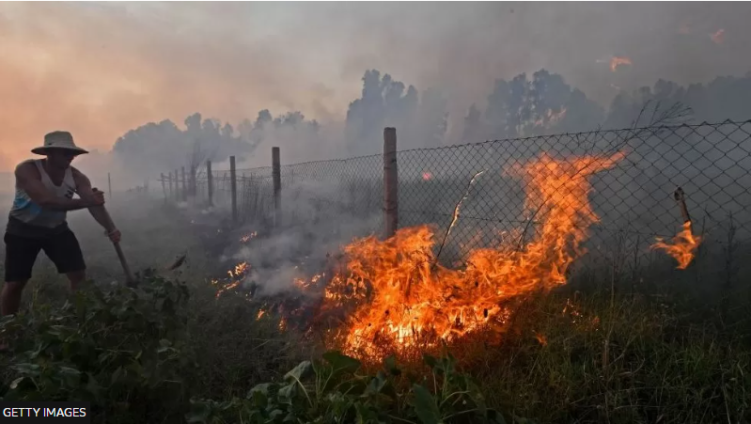At least 34 people have been killed and thousands evacuated after wildfires broke out across Algeria, the country's interior ministry says.
Outbreaks of 97 wildfires were recorded across 16 provinces affecting forest, crops and farmland on Monday.
About 8,000 firefighters were working to bring the blazes under control, authorities said.
Twenty-six people were also injured and 1,500 evacuated from their homes in Fenaia, Bejaia, Zbarbar and Bouira.
Ten soldiers were killed battling the fires in Bejaia, the Algerian defence ministry said.
The most extensive fires, in the mountainous Kabylie region to the east of Algiers, spread to residential areas in the coastal towns of Bejaia and Jijel, fanned by high winds.
Authorities said they had launched a judicial investigation into the causes of the fires.
Northern Algeria has been experiencing a record heatwave in recent days, with temperatures reaching 48C.
Temperatures in several regions in North Africa are up to 7C higher than normal for the time of year.
Algeria's Meteorological Office has warned that temperatures of more than 48C are likely to continue until the end of the month in the north of the country.
On Monday, Algeria's national electricity and gas company, Sonelgaz, said it had recorded a "historic peak" in electricity consumption.
A leading outlet critical of the government, Tout Sur l'Algerie (TSA), reported earlier this month there had been an unprecedented use of air conditioners, saying current methods of construction were less effective than traditional bricks in keeping homes cool.
Meanwhile, southern Europe has been dealing with a challenging heatwave that has seen Greece ravaged by wildfires.
The UN weather agency, the World Meteorological Organization, has warned that the heatwave in Europe could continue into August and that the extreme temperatures sweeping the globe are the new normal in a world warmed by climate change.
The three hottest days ever recorded were in July, according to the EU climate and weather service, Copernicus.
The average world temperature hit 16.89C on Monday 3 July and topped 17C for the first time on 4 July, with an average global temperature of 17.04C.
Provisional figures suggest that was exceeded on 5 July when temperatures reached 17.05C.
The World Meteorological Organization says extreme weather patterns highlight the need for greater climate action.
Climate change increases the risk of the hot, dry weather that is likely to fuel wildfires. The world has already warmed by about 1.1C since the industrial era began and temperatures will keep rising unless governments around the world make steep cuts to emissions.
Latest Stories
-
GOIL CEO tours Tema Lubes Oil Company
1 hour -
Communication Minister meets Afriwave Telecom management
1 hour -
We cannot remain imprisoned in history and lamentation – Prof. Lumumba urges
2 hours -
Ukraine allies pledge €21bn in fresh military aid
2 hours -
Bawku: IGP’s recruitment comment may be well-intended but timing is bad – Security analyst
2 hours -
We must re-enter 21st century with laws known to Ghana – Prof Lumumba
2 hours -
Minority urges gov’t to take drastic action amid fresh clashes in Bawku
2 hours -
Bosompem Richmond writes: IGP Yohunu’s approach to Bawku conflict dangerous
2 hours -
Bawku crisis: IGP’s recruitment comment out of place – Minority
2 hours -
Lecturers exempted from post-retirement contract ban – Education Minister
3 hours -
U.S. Army Europe Band’s Barbarossa Woodwind Quintet thrills pupils of Ringway Estate Basic School in Accra
3 hours -
‘If the Finance Minister doesn’t get it right…’ – AGI Boss warns of fallout from Trump tariffs
3 hours -
Engage youth to restore peace in Bawku – Minority tells Government
4 hours -
We must re-examine our education system – Prof. Lumumba
4 hours -
‘We need collective engagement’ – AGI Boss urges national unity as U.S. tariffs threaten economy
4 hours

